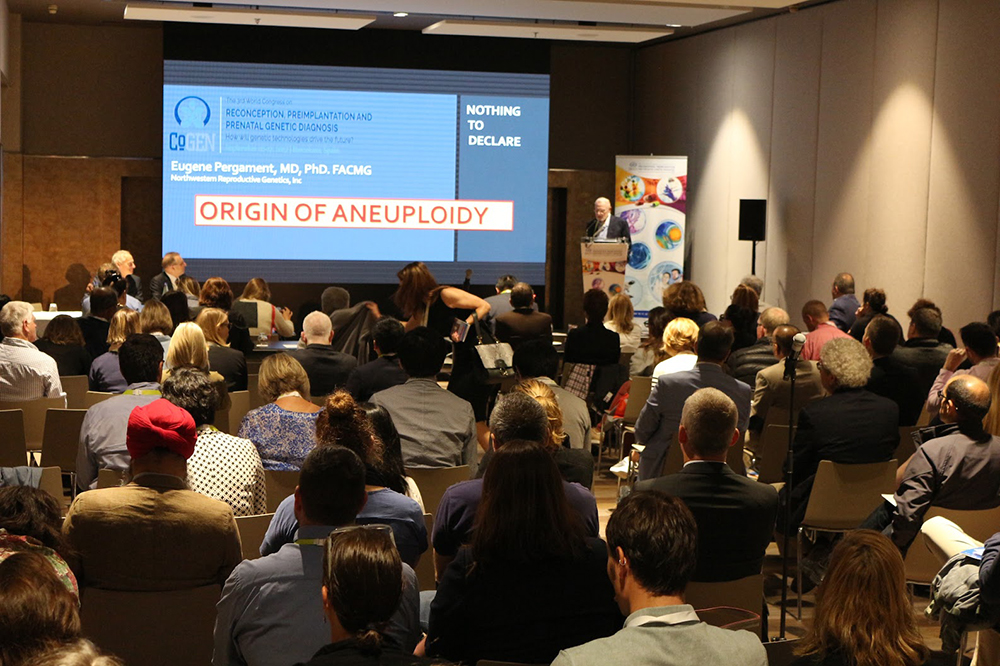| Thursday, May 16, 2024 | |
|---|---|
| 09:00 | Welcome address Alexandra Benachi, France, Yuval Yaron, Israel |
| 09:00-10:30 | Session 1: Advances in non-invasive prenatal testing Session Chair: Alexandra Benachi, France and Yuval Yaron, Israel |
| 09:00-09:30 | The multiple benefits of genome wide NIPT Erik Sistermans, The Netherlands |
| 09:30-10:00 | First trimester screening on CMV infection using data generated for whole genome NIPT Brigitte Faas, The Netherlands |
| 10:00-10:30 | Follow-up diagnostic testing in cases of abnormal genome-wide NIPT: considerations and pitfalls Diane Van Opstal, The Netherlands |
| 10:30-11:00 | Coffee Break |
| 11:00-13:00 | Session 2: Noninvasive prenatal testing – NIPT Chairs: Brigitte Faas, The Netherlands, Erik Sistermans, The Netherlands |
| 11:00-11:30 | Unlocking the Potential of Cell-Based Non-Invasive Prenatal Testing (cbNIPT) for Single Gene Disorders: Advancements, and Future Directions Line Dahl Jeppesen, Denmark |
| 11:30-12:00 | Non-invasive prenatal diagnosis of single gene disorders: where are we now & where are we going? Juliette Nectoux, France |
| 12:00-12:30 | The residual risks for a fetal chromosome aberration when NIPS is normal: a retrospective study Diane Van Opstal, The Netherlands |
| 12:30-13:00 | Metanalysis cfDNA for recurrent pregnancy loss Toni Borrell, Catalunia |
| 13:00-14:00 | Lunch |
| 14:00-16:00 | Session 3: Prenatal Exome & Genome sequencing 1 Chairs: Hagit Daum, Israel, Brynn Levy, USA |
| 14:00-14:30 | Prenatal sequencing: how should we be using this powerful diagnostic tool? Lyn Chitty, UK |
| 14:30-14:50 | The yield of whole exome sequencing in IUGR Toni Borrell, Catalunia |
| 14:50-15:10 | All-in-one rapid fetal sequencing service: the Nijmegen experience Brigitte Faas, The Netherlands |
| 15:10-15:30 | Monogenic conditions and central nervous system anomalies: A prospective study, systematic review and meta-analysis Fionnuala Mone, UK |
| 15:30-16:00 | Exome or Genome sequencing for prenatal diagnosis? Our experience of 1,700 cases combining the benefits of both Heinz Gabriel, CeGAT, Germany |
| 16:00-16:30 | Coffee Break |
| 16:30-18:00 | Session 4: Prenatal Exome & Genome sequencing 2 Chairs: Toni Borrell, Catalunia, Jouliette Nectoux, France |
| 16:30-17:00 | Prenatal exome sequencing in anomalies of the corpus callosum : lessons from a cohort of 369 fetuses Solveig Heide, France |
| 17:00-17:30 | Exome or genome sequencing in prenatal diagnosis? Chritel Thauvin, France |
| 17:30-18:00 | How is fetal medicine integrated into rare disease plans in France? Sylvie Odent, France |
| 18:00 | Welcome reception |
| Friday, May 17, 2024 | |
|---|---|
| 09:00-10:30 | Session 5: Early embryonic development and Aneuploidy Chairs: Raoul Orvieto, Israel, Christian Ottolini, Italy |
| 09:00-09:30 | Mechanics of human embryo compaction Julie Firmin, France |
| 09:30-10:00 | Genomic diagnosis of oocyte and embryo developmental arrest Antonio Capalbo, Italy |
| 10:00-10:30 | Karyomapping for PGT-A and PGT-SR Alan Handyside, UK |
| 10:30-11:00 | Coffee Break |
| 11:00-12:00 | Session 6: Preimplantation genetic testing – PGT Chairs: Dagan Wells, UK, Tony Gordon, UK |
| 11:00-11:30 | Non-invasive PGT-A Should we adopt or neglect? Raoul Orvieto, Israel |
| 11:30-12:00 | Developing PGT beyond standard aneuploidies Antonio Capalbo, Italy |
| 12:00-13:00 | Session 7: Debate Should we use CRISPR gene editing in human embryos? Moderator: Gerald Schatten, USA |
| 12:00-12:30 | PRO: Dagan Wells, UK |
| 12:30-13:00 | CON: Nada Kubikova, UK |
| 13:00-14:00 | Lunch |
| 14:00-16:00 | Session 8: Preimplantation genetic testing – PGT & Novel genetic approaches Chairs: Antonio Capalbo, Italy, Julie Firmin, France |
| 14:00-14:30 | Mosaic embryos – are they accurately detected by PGT-A? Christian Ottolini, Italy |
| 14:30-15:00 | New PGT technologies; New insights Tony Gordon, UK |
| 15:00-15:30 | Novel DNA Technologies Brynn Levy, USA |
| 15:30-16:00 | The use of artificial intelligence for genetic counseling Yuval Yaron, Israel |
| 16:00-16:30 | Coffee Break |
| 16:30-18:00 | Session 9: A combined session for the OC and COGEN Charis: Samir Hamamah, France, Yuval Yaron, Israel |
| 16:30-17:00 | Ex utero embryogenesis: Naïve pluripotent stem-cell-derived embryoid models (SEMs) Yaqub Hanna, Israel |
| 17:00-17:30 | To the Future… and Beyond! Gerald Schatten, USA |
| 17:30 | Closing remarks Samir Hamamah, France, Milton Leong, Hong Kong, Zeev Shoham, Israel and Yuval Yaron, Israel |
